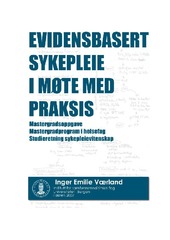Evidensbasert sykepleie i møte med praksis
Master thesis
Permanent lenke
https://hdl.handle.net/1956/3361Utgivelsesdato
2007Metadata
Vis full innførselSamlinger
Sammendrag
Evidence-based practice is a discussed issue, also in critical care nursing. The purpose of this study has been to examine to what extent medical evidence accounts for nursing to the patients that are weaning from ventilator. I have used qualitative method and have interviewed intensive care nurses about their experience with the weaning protocol. The interviews were examined by using a structural analysis. In the discussion of data the statements of the intensive care nurses were discussed with different evidence- and knowledge concepts. Theories of Katie Eriksson, Kari Martinsen, Herdis Alvsvåg and Patricia Benner have also been significant. The findings show that the weaning protocol is useful as a mutual strategy for weaning, but it accounts only to some extent for nursing to the actual group of patients. Informants describe nursing as concrete nursing interventions, for instance estimations of respiration and mobilization. Moral aspects of nursing are described as sensibility, communication with the patient and to express protection. Nursing that goes beyond what the protocol describes is learned by experience and in the collective of colleges. The findings in this study suggest that theory about clinical wisdom / judgement to a greater extent than the evidence-based weaning protocol accounts for nursing to the weaning patients. A concept of evidence that describes more aspects of nursing than medical evidence will also give a better description. Evidence-based knowledge, as the weaning protocol is an example of, is a part of the knowledge base of the intensive care nurses. If the focus is on this kind of knowledge only, other parts of the knowledge within intensive care nursing can be invisible or can vanish.
Utgiver
The University of BergenOpphavsrett
Copyright the author. All rights reservedThe author
